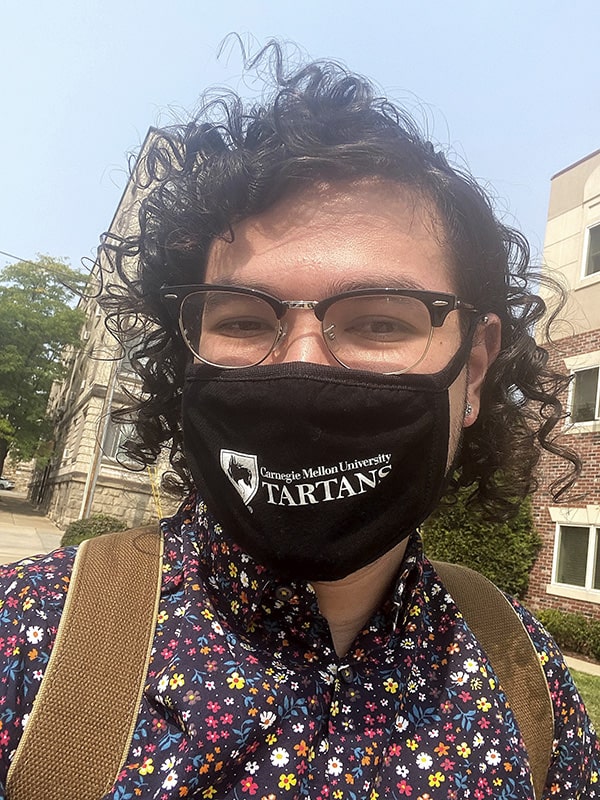Senior Stars in Astrophysics Research
While untangling a gravitational web of black holes and binary stars, Carnegie Mellon University's Alexis Ortega is into the world of astrophysics.
He also is out of this world when it comes to making the most of his CMU experience. A first-generation college student, he arrived in Pittsburgh from his hometown of Santa Ana, California, a predominantly Latino city south of Los Angeles.
"Latinos are underrepresented minorities in physics, so I knew there would only be a handful of Latino students in my classes. But I never once felt like I didn't belong," he said. "I felt like as long as I worked hard, I would be able to be successful in my program.
He approached his first year at CMU with a positive attitude and worked with the Student Academic Success Center to stay on top of his classes. He also attended the Mellon College of Science's COMPASS meetings. The organization, which is short for Coaching Minority Progress and Academic Success in Science, provides students with mentors and networking opportunities.
"My freshman year, I didn't know much about physics. I had to get extra help. I don't see that as a bad thing," he said. "You should never feel ashamed of asking for help."
As his confidence in physics grew, Ortega gave back to the undergraduate physics community. He helped fellow students by tutoring them in courses he had previously taken and served on two steering committees to talk about the undergraduate experience in the Department of Physics and Student Affairs, respectively.
Hy Trac, an associate professor of astrophysics and cosmology, said Ortega is an excellent role model.
"Alexis cares about the well-being of his fellow students," Trac said.
As a junior, Ortega reached out to CMU Assistant Professor Carl Rodriguez, a theoretical and computational astrophysicist who was then wrapping up a postdoctoral position at Harvard, to learn more about work on the dynamics of stars, black holes and the gravitational waves they create.
"I was interested in his gravitational wave research. I also thought it was really cool that he was coming in as a Latino professor, and I wanted to make that connection," Ortega said.
Rodriguez, who joined CMU in the fall of 2020, advised Ortega on a Summer Undergraduate Research Fellowship earlier that year.
"We talked about the fact that we're both Latino," Rodriguez said. "There's something to be said in working with someone who shares a background with you. As well as the importance of bringing in people at all levels of academia."
Through working with Rodriguez, Ortega learned the computer languages Python and C and how to use a supercomputer in CMU's Cosmology group. He created simulations to study how two black holes — once binary stars — orbiting each other might interact with a nearby third black hole. The interaction can cause gravitational waves, or ripples in space-time, that can be detected from Earth using the Laser Interferometer Gravitational-wave Observatory, known as LIGO.
The work may have implications to help understand how gravitational forces can affect the evolution of binary stars.
Rodriguez said that Ortega has a knack for understanding problems by taking them apart piece by piece.
"Every researcher hones that skill at some point, and Alexis has absolutely done that. He wants to really dig into projects that he's working on," he said.
After graduation, Ortega is going to Brown University to pursue a Ph.D. in physics.
"I'm excited that he's going off to Brown. His background in stellar dynamics and three body dynamics will be very helpful," Rodriguez said. "I was really impressed with how well Alexis was able to power through the pandemic. Even working from home this semester he's been really on top of what he's doing."
Trac agreed. Having taught two of Ortega's upper-level physics courses Trac watched him adapt to going remote for the second part of the spring 2020 semester. While Ortega was home in California, he was waking up early to virtually attend classes that started at 6 a.m. Pacific time.
"He would tell me that even though it was early, he made a point to make it to class every time because he really enjoyed it," Trac said.
For Ortega, his whole CMU journey has been important.
"It goes to show that wherever you start doesn't necessarily correlate to where you end up," he said.
